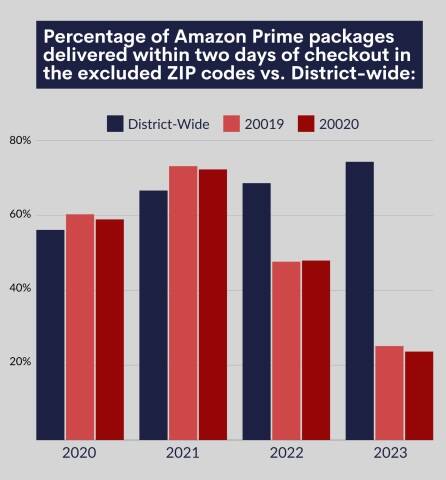Amazon accused of cheating low-income Prime users out of two-day deliveries
Lawsuit says e-commerce giant cut two zip codes from its own fleet without telling residents
Amazon has trouble in the US capital, where the city's attorney general alleged in a lawsuit filed today that the company excluded two postal zip codes from its fastest Prime delivery service without informing customers.
The lawsuit [PDF] was filed by D.C. attorney general Brian Schwalb's office today in the District of Columbia Superior Court. It alleges that Amazon implemented a delivery "exclusion" for two east-D.C. areas, zip codes 20019 and 20020 in June 2022. Instead of using its own in-house delivery fleet to ensure expedited shipping, it began relying on third-party delivery services like UPS and the US Postal Service, resulting in slower delivery times, according to the lawsuit.
Both zip codes, we note, are predominantly Black neighborhoods with lower income and high levels of unemployment that the D.C. AG's office described in its suit as being "underserved" by traditional retail operations.
According to the suit, nearly half of the population of the zip codes are Amazon Prime subscribers, amounting to around 50,000 customers who've ordered more than 4.5 million Prime-eligible packages in the past four years.
"Yet because these Prime members usually have not received their packages within two days since mid-2022, when Amazon secretly imposed its exclusion, they are not getting the faster delivery times they are paying for," court documents allege.
The suit contends that Amazon offers the same Prime services, at the same price, to customers inside and outside of 20019 and 20020 despite the affected areas not being able to receive advertised Prime shipping benefits. According to the AG's office, two-day delivery rates in Washington, D.C. have continued to improve in recent years, while the two affected zip codes have seen their two-day rates drop to just over 20 percent since the exclusion was put into effect.

A chart from the Washington, D.C. AG's office showing two-day Amazon Prime delivery rates throughout the city, and in the two excluded zip codes - Click to enlarge
"Amazon is charging tens of thousands of hard-working Ward 7 and 8 residents for an expedited delivery service it promises but does not provide," Schwalb said in a press release. "While Amazon has every right to make operational changes, it cannot covertly decide that a dollar in one ZIP code is worth less than a dollar in another."
The lawsuit doesn't include any supporting documentation for the claim that two-day delivery times in the affected zip codes have dropped since 2022. We reached out to the D.C. AG's office for more information, but haven't heard back.
When asked whether it had excluded the subject zip codes from two-day deliveries via the Amazon fleet, Amazon global media relations director Kelly Nantel acknowledged the change to The Register, claiming the move was a driver safety issue.
"In the zip codes in question, there have been specific and targeted acts against drivers delivering Amazon packages," Nantel said in an emailed statement. "We made the deliberate choice to adjust our operations, including delivery routes and times, for the sole reason of protecting the safety of drivers."
- Amazon antitrust case in Washington DC is resurrected
- Dumping us into ad tier of Prime Video when we paid for ad-free is 'unfair' – lawsuit
- Amazon overcharges shoppers with Buy Box algorithm, fresh lawsuit claims
- Date set for for epic Amazon-FTC antitrust showdown
As Schwalb noted and the lawsuit contends, the exclusion order isn't the problem - it's the lack of information given to Prime customers about the fact they can't get the two-day delivery promised to most others who pay upwards $139 a year for the promised service. Amazon insists that's not the case.
"The claims made by the [D.C.] Attorney General, that our business practices are somehow discriminatory or deceptive, are categorically false," Nantel said. "We're always transparent with customers during the shopping journey and checkout process about when, exactly, they can expect their orders to arrive."
That's not a direct answer to whether Prime customers in 20019 and 20020 are getting what they pay for, we note, but Amazon said it's committed to working with the nation's capital to improve things.
"What we'd like to do, and have offered, is to work together with the Attorney General and their office in an effort to reduce crime and improve safety in these areas," Nantel said.
The lawsuit charges Amazon with one count of violating Washington, D.C.'s Consumer Protection Procedures Act, and the AG's office is seeking a jury trial to compel Amazon to make it clearer that the zip codes are exclusion zones, as well as unspecified restitution and civil penalties payable to affected customers. ®
